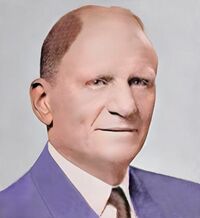Vous pouvez contribuer simplement à Wikibéral. Pour cela, demandez un compte à adminwiki@liberaux.org. N'hésitez pas !
Lawrence Fertig
| Lawrence Fertig | |||||
| Chef d'entreprise | |||||
|---|---|---|---|---|---|
| Dates | 1898 - 1986 | ||||

| |||||
| Tendance | Libéral | ||||
| Nationalité | |||||
| Articles internes | Autres articles sur Lawrence Fertig | ||||
| Citation | |||||
| Interwikis sur Lawrence Fertig | |||||
Lawrence W. Fertig (1898-1986) était un publicitaire américain, journaliste et commentateur économique libertarien. Il a écrit dans les colonnes du New York World-Telegram et du New York Sun. Il est le fondateur de sa propre société de publicité et de marketing, Lawrence Fertig & Company.
Après avoir reçu son diplôme de premier cycle de l'université de New York, Lawrence Fertig est allé à l'université de Columbia, où il a étudié l'économie. Il a terminé sa maîtrise dans ce domaine. Mais l'avènement de la Seconde Guerre mondiale a détourné son attention de ses études de doctorat.
Il a assisté à la conférence de Bretton Woods en 1944, envoyé en reportage par le journal Scripps-Howard. Il a rédigé une chronique hebdomadaire sur les questions financières, ce qu'il continua de faire jusqu'à la fermeture du New York World Journal Tribune, à la fin des années 1960. Il est entré ensuite au conseil d'administration de la Fondation d'éducation économique et a contribué à quelques commentaires dans la revue mensuelle, The Freeman. Impliqué dans le mouvement de la liberté, à Munich, en septembre 1970, il participe à la réunion de la Société du Mont-Pèlerin où plusieurs présentations, dont la sienne, traitent de l'image de l'entrepreneur dans divers pays[1].
Lawrence Fertig fut membre du conseil d'administration de l'université de New York où il a joué un rôle imminent dans le soutien de son ami Ludwig von Mises. Lorsque l'économiste autrichien a fui l'Europe et les nazis pour les États-Unis durant la Seconde Guerre mondiale, il n'avait pas beaucoup d'amis sur le nouveau continent, les expatriés autrichiens étant disséminés. Lawrence Fertig fut rapidement présenté à Ludwig von Mises, via Henry Hazlitt. Tous les deux ont réussi à faire accepter Ludwig von Mises par l'université de New York afin qu'il y enseigne gratuitement, son salaire étant couvert par une fondation que sollicitée par les deux hommes.
Notes et références
- ↑ Une version condensée de sa communication est transmise dans The Freeman, Lawrence Fertig, 1970, Profits and Profit Makers: What Does the Public Think About Them?, Octobre, Vol 20, n°10
Publications
- 1958, "Readjustment Without Inflation", The Freeman, August, Vol 8, n°8, pp32-34
- 1959,
- a. "The Only Way To Sound Growth", New York World Telegram and Sun, 24 août
- Repris en 1959, "The Only Way To Sound Growth", The Freeman, Octobre, Vol 9, n°10
- Repris en 1960, "The Only Way To Sound Growth", In: "Essays on Liberty", Vol. VII, Foundation for Economic Education, pp268-271
- b. "The Dollar Will be on the Defensive", The Freeman, April, Vol 9, n°4, pp40-42
- a. "The Only Way To Sound Growth", New York World Telegram and Sun, 24 août
- 1960, Do The Facts Justify A Higher Tarriff Wall?, The Freeman, Mai, Vol 10, n°5
- 1961, "Prosperity through Freedom", Chicago, Henry Regnery Co.
- 1961, "Subsidies for Everyone–A New Way of Life", New York world telegran and sun, 9 octobre
- Repris en 1962, "Subsidies for Everyone–A New Way of Life", The Freeman, January, Vol 12, n°1, pp14-16
- 1963,
- a. "How Newspeak Changes Plains Words", The Freeman, Mai, Vol 13, n°5
- b. "Economic Planning in Some Western Countries", Il Politico, n°1: La ricomparsa della pianificazione economica in occidente, pp100-
- Traduction en italien en 1963, "Pianificazione economica in alcuni paesi occidentali", Il Politico, n°1: La ricomparsa della pianificazione economica in occidente, pp108-
- 1966, "The Government Veto System", The Freeman, novembre, Vol 16, n°11, pp17-21
- 1967,
- a. "Right Premise - Wrong Conclusion", The Freeman, January, Vol 17, n°1, pp11-17
- b. "Labor Union Demands Mean More Inflation", The Freeman, Juillet, Vol 17, n°7
- 1968,
- a. "Progress Means Change", The Freeman, January, Vol 18, n°1, pp35-37
- b. dir., "What's Past Is Prologue. A commemorative evening to the Foundation for Economic Education on the Occasion of Leonard Read's Seventieth Birthday", Irvington-on-Hudson, N.Y.: Foundation for Economic Education
- c. "Foreword", In: Lawrence Fertig, dir., "What's Past Is Prologue. A commemorative evening to the Foundation for Economic Education on the Occasion of Leonard Read's Seventieth Birthday", Irvington-on-Hudson, N.Y.: Foundation for Economic Education, pp3-5
- d. "Comment", In: Lawrence Fertig, dir., "What's Past Is Prologue. A commemorative evening to the Foundation for Economic Education on the Occasion of Leonard Read's Seventieth Birthday", Irvington-on-Hudson, N.Y.: Foundation for Economic Education, pp8-10, p15, pp21-22, pp31-33, p36, pp43-44, pp53-54
- 1970, Profits and Profit Makers: What Does the Public Think About Them?, The Freeman, Octobre, Vol 20, n°10
- 1971, "The Genius of Mises's Insights", In: Floyd A. Harper, Henry Hazlitt, Leonard Read, Gustavo R. Velasco, Friedrich August von Hayek, dir., "Toward Liberty: Essays in Honor of Ludwig von Mises", vol 2, Menlo Park: Institute for Humane Studies, pp123-131
- 1975, The Political Costs of Price Inflation, The Freeman, Mars, Vol 25, n°3
Littérature secondaire
- 1962,
- Edith Efron, commentaire du livre de Lawrence Fertig, "Prosperity for freedom", The Objectivist Newsletter, Vol 1, n°3, March
- Myron Q. Hale, commentaire du livre de Lawrence Fertig, Prosperity through Freedom, The Western Political Quarterly, Vol 15, n°3, Sep., pp552-553
- J. Edwin Malone, Fertig’s “ Prosperity Through Freedom ”, New Individualist Review, Winter, Vol 1, n°4
- 1986, William F. Buckley Jr., "Lawrence Fertig, RIP - obituary", National Review, 21 Novembre
Liens externes
- (en)Obituary: Lawrence Fertig, New York Times. 28 Octobre 1986
- (en)Lawrence Fertig, 1898-1986, The Free Market, Février, 1987, p5
| Accédez d'un seul coup d’œil au portail des grands auteurs et penseurs du libéralisme. |